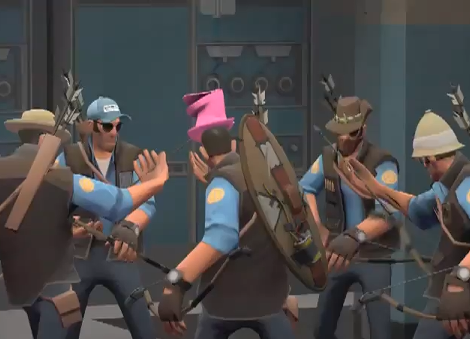 Sniper was born in the Australian outback. As he grew up, he made a living hunting animals. Nowadays he travels America in a battered camper van, and makes a living hunting men. He has long chats with his mum over the phone, but has a hard time getting on with his dad. He takes pride in doing a difficult job well. He’s a charming, funny character, and at any one time there can be up to 32 of him running around shooting each other.
Sniper was born in the Australian outback. As he grew up, he made a living hunting animals. Nowadays he travels America in a battered camper van, and makes a living hunting men. He has long chats with his mum over the phone, but has a hard time getting on with his dad. He takes pride in doing a difficult job well. He’s a charming, funny character, and at any one time there can be up to 32 of him running around shooting each other.
In a board game, “The Sniper” would be a collection of stats made as an abstract representation of a type of person; a group of people trained in a certain way, with a certain type of weapon. In Team Fortress 2 the Sniper is a very specific man, with a mum, and a dad, and a history, and up to 31 identical doppelgangers.
I have never seen anyone question this.
Let’s go further. In a board game, a “Capture Point” is an abstract representation of territorial control. In Team Fortress 2, it’s literally a giant metal plate that someone’s nailed into the ground; stand on it for a few minutes and the territory is yours. We’ve all gotten past the weirdness of respawning years ago, but it also bears remembering that these mercs are in a Sisyphean hell; forced to repeat their battles over and over and over again, being brought back to fight and die endlessly. In a board game, that would represent reinforcements. Here, it’s the same bloke popping back from the land of the dead.
This isn’t just TF2. While board games depend on metaphorical mechanics, videogames are exactingly literal about everything. With a few exceptions, anything that happens on the screen is exactly what is going on in the fiction. Mario is literally double-jumping in the air, and growing to twice his size, and killing Bowser by stomping on his head.
This gets powerfully strange when you mingle the usual videogame stuff with more metaphorical systems. Turn-based games are the big example here: At their core, turns are a really abstract system for representing time. If the rest of the game is pretty abstract – like, say, Blight of the immortals – this feels fine. When you see realistic 3D models with animations facing off against other animated models in a fully detailed environment, the literal impulse kicks in. It feels like what’s happening on the screen is a 1 to 1 representation of what is going on in the real world. At that point, you realize that everyone is standing around, waiting for their turn to hit a dude.
Most turn-based games actually have idle animations, for gods sakes- animations that show unused characters breathing, twiddling their thumbs- animations that make it clear that time has not frozen for them while another character moves. That they are literally standing there in real time, waiting for everyone else to have a go.
Team fortress 2 gets over it’s literal tangle by just not caring. It’s worth wondering, when someone complains about how a new weapon or hat damages the fiction – is this a world with any internal consistency at all? But it wears it so brazenly that I’ve never even seen someone mention how weird it is that everyone’s fighting their doppelganger. Judging by the amount of jokes about waiting for your turn, though, almost everyone gets weirded out by the uncanny intersection of representational and literal in turn-based games.
It’s understanding, I think, that’s needed here; taking time to consider which mechanics are representational, and exactly what they’re representing.










The idle animations in Final Fantasy X do serve a purpose (telling if a character is hasted/slowed/normal speed at a glance without abstract icons) but I see your point overall. It’s like in Dragon Age: Origins when your own created character acknowledges you giving them orders. Aren’t they you?
great points altogether, you just gained a new reader. What might you suggest about your publish that you made a few days ago? Any sure?
I’ve recently started a blog, the information you offer on this website has helped me greatly. Thank you for all of your time & work. “The achievements of an organization are the results of the combined effort of each individual.” by Vince Lombardi.
I have been exploring for a bit for any high quality articles or blog posts in this sort of area . Exploring in Yahoo I at last stumbled upon this site. Studying this info So i am satisfied to exhibit that I’ve a very good uncanny feeling I came upon exactly what I needed. I most indubitably will make certain to don¡¦t disregard this web site and give it a look regularly.
http://www.pornogratisdiario.com
Whats up! I just wish to give an enormous thumbs up for the nice info you have here on this post. I will be coming back to your blog for extra soon.